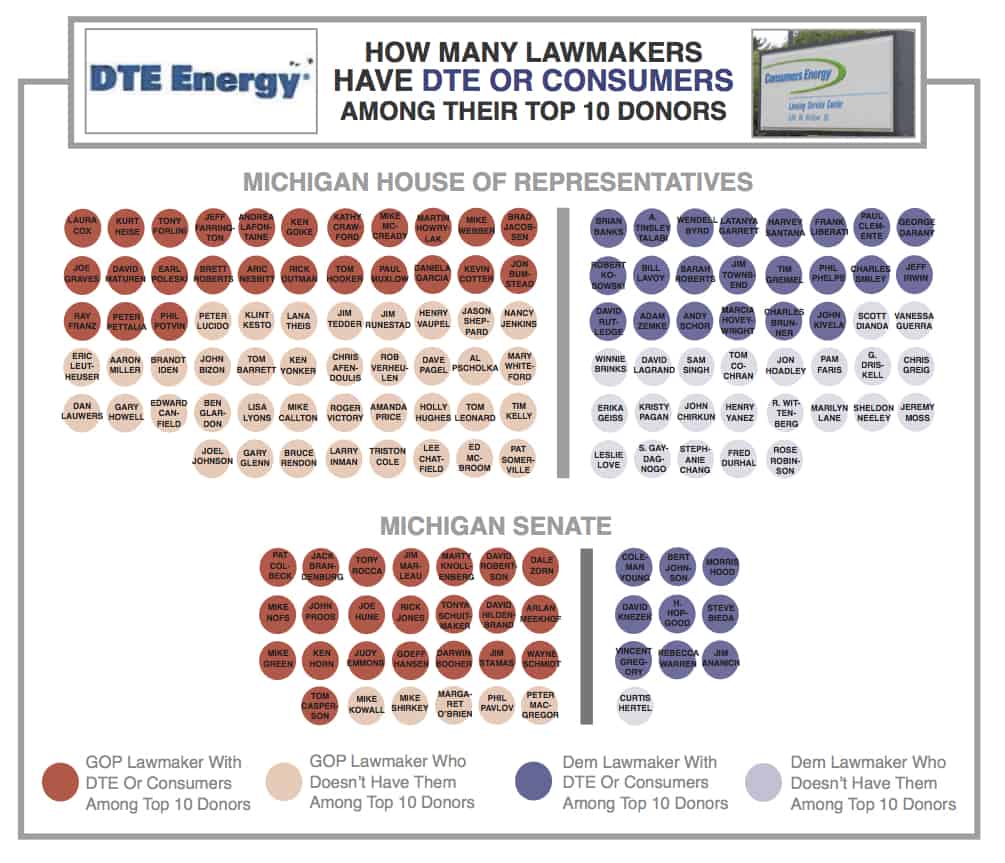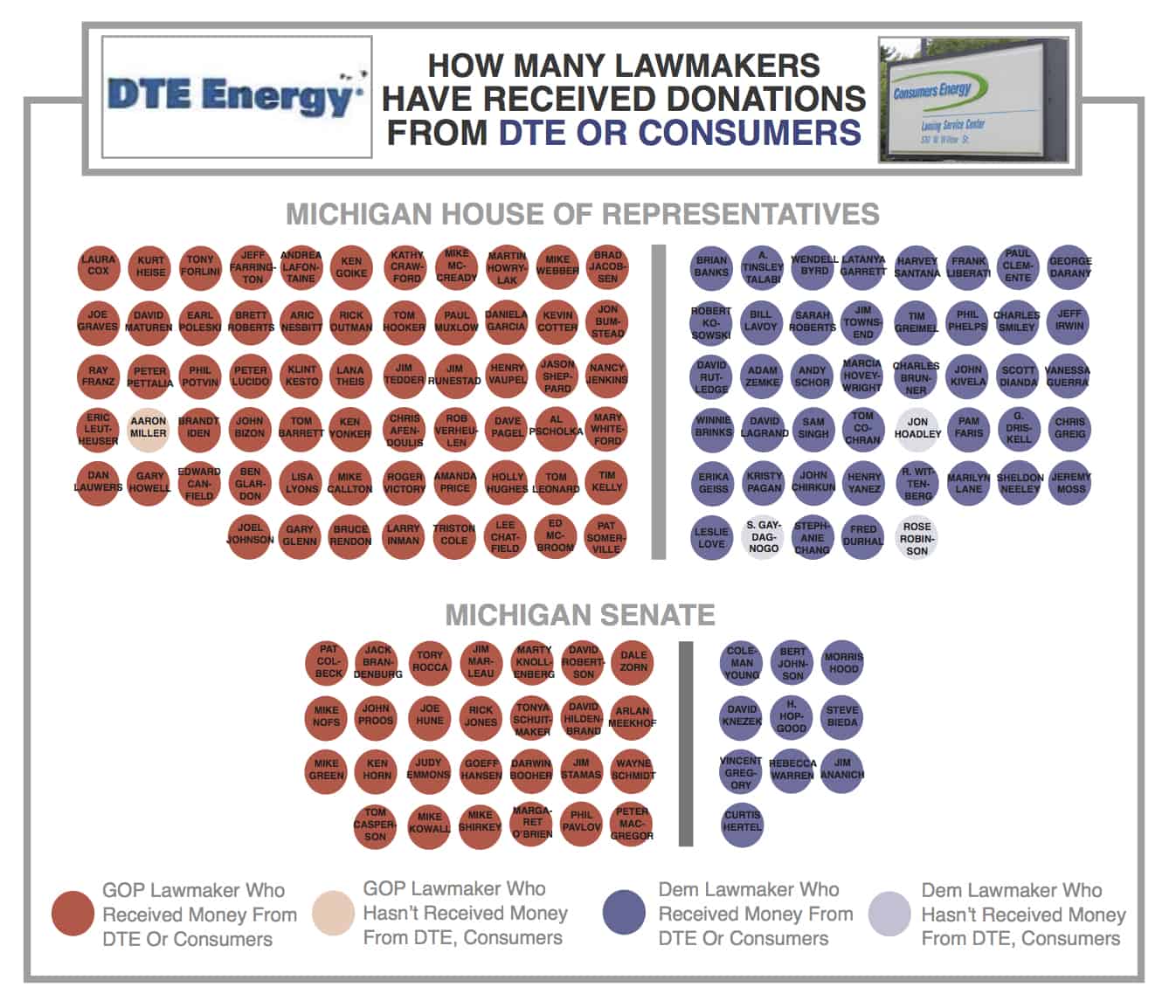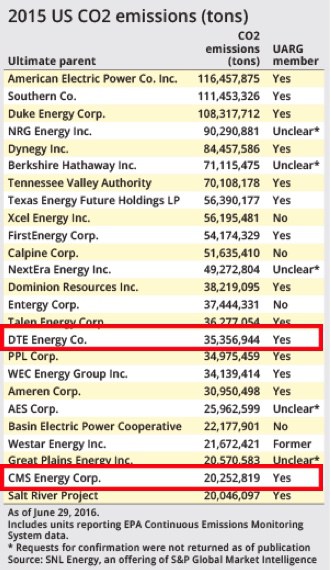A few days after it was announced that a petition process has started with the goal of having voters decide if Michigan utilities must have 30% of their power come from renewable energy sources by 2030, DTE Energy CEO Gerry Anderson announced the utility’s opposition.
“Complex public policy should be undertaken by ballot initiative as a last resort,” he told Michigan Radio.
Anderson also told The Detroit News that the energy policy should be left to state legislators to decide and, that the increase to 30% by 2030 renewable energy standard somehow isn’t good for renewable energy. “I am talking to the supporters of the ballot proposal, because I’ll be honest, I don’t think this is good for the cause of climate change or renewables in Michigan, and I’ve told them that.”
A Consumers Energy spokeswoman said, “We do not need a legal mandate to do the right thing for our customers, Michigan and our planet.” But then on February 19, Consumers Energy CEO Patti Poppe announced that the utility has set a company goal of going 40% renewable by 2040 but is still against the 30% by 2030 ballot proposal. Poppe said, “Energy is complex, and a simple yes-no, up-down ballot proposal doesn’t leave Michigan the flexibility it needs to make this transition most cost-effective.”

(Renew Missouri)
This type of “complex” energy policy, however, has been enacted by ballot initiatives in the past. In 2008, Missouri voters passed that state’s RES by ballot initiative with 66% of the vote.
In 2006, voters in Washington passed that state’s RES. And in 2004, Colorado became the first state in the nation to pass an RES by ballot initiative. The modest 10% standard that voters in Colorado passed at the time has only increased, in part due to the major utility there, Xcel Energy, embracing renewable energy. Colorado’s current RES is 30% by 2020 but Xcel Energy is working towards 55% by 2026.
“We have a responsibility to meet our customers’ energy needs. Our customers expect us to provide low-cost power and increase the use of cleaner energy. As the state’s largest utility, it is important to us that we also support rural areas in Colorado, and this proposal’s investment will accomplish this goal,” said David Eves, president, Xcel Energy in Colorado.
It makes sense that DTE and Consumers Energy would argue that the legislature should decide energy policy, and not voters. DTE contributed $257,475 and Consumers Energy contributed $200,225 to state legislative candidates and their associated PACs in 2017 alone. And from January through April of 2018, the utilities contributed a total of $236,500 to legislative candidates and their PACs.
In 2016, the Michigan Campaign Finance Network found that since 2011 DTE and Consumers were among the top 10 donors for 78 of the 145 legislators at the time – and have given to all but four state lawmakers.

In 2016, DTE and Consumers were among the top 10 donors for 78 of the 145 legislators. (Michigan Campaign Finance Network)

In 2016, DTE and Consumers had contributed money to all but 4 of the 145 legislators. (Michigan Campaign Finance Network)
The state legislature is also where the utilities had previously tried to do away with the state’s RES. In 2015, Crain’s Detroit reported that DTE and Consumers Energy supported legislative efforts to repeal the state’s 10% by 2015 RES (it has since increased). The utilities justified their reasoning in stating that Obama’s Clean Power Plan would be enough of a mandate to spur renewable energy growth. However, both utilities are members of the Utility Air Regulatory Group, which sued the EPA over the Clean Power Plan – along with coal companies and many Republican Attorneys General – the same policy the utilities said would require them to build renewables.

Members of UARG confirmed by SNL Energy
As for Anderson’s statement that a renewable energy standard wouldn’t be good for renewables, the Lawrence Berkeley National Report has found that RES’ are actually key drivers of the renewable energy growth in the country. In 2016, Vox’s Dave Roberts wrote about the benefits of these laws, such as how they benefit the environment and reduce pollution.
Consumers Energy’s claim that it “doesn’t need a legal mandate” to build more renewable energy also rings false, based on recent events. The company has been lobbying Michigan regulators to change a rule that would risk scuttling hundreds of megawatts of solar energy projects being pursued by other companies. The rationale Consumers is using is that the state doesn’t need the electricity from the solar farms, even as it appeals to the same regulators to let it build more of its own solar farms.
This post was updated to include contributions from the April 2018 quarterly statement.


[…] bills that would remove Michigan’s arbitrary cap on distributed solar. In addition, the utility has consistently opposed proposals for a more ambitious renewable energy standard in Michigan, even though such measures are major drivers of renewable energy […]